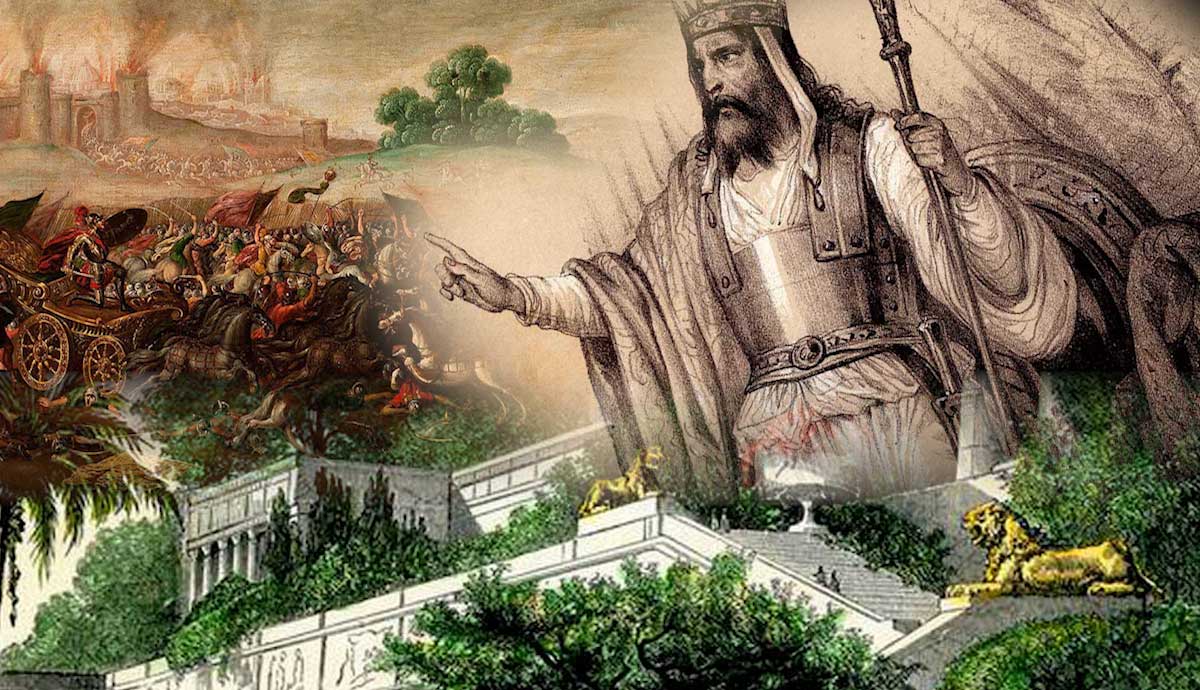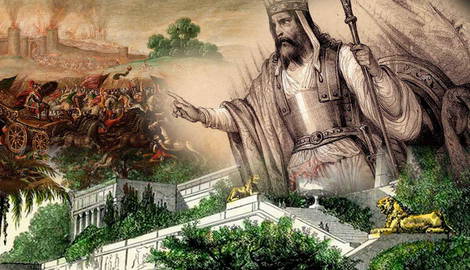
King Nebuchadnezzar II was the renowned second king of the Neo-Babylonian Empire. He is a historical figure who ruled from 605-562 BCE but also appears in stories in the Bible. The eldest son of Nabopolassar, Nebuchadnezzar led the Babylonian army to several important victories while also restoring the greatness of the city of Babylon. According to the Bible, while Nebuchadnezzar was a pagan, he came to understand and accept the power of the God of the Israelites through Daniel. But in his power, Nebuchadnezzar believed that he should be worshipped like a god. For this hubris, God humbled him by making him live as an animal for seven years, causing him to become a king of men and beasts before restoring him to his former position.
Nebuchadnezzar II: Warrior King & Conqueror of Nations

Nebuchadnezzar is a legendary figure who appears in the Bible as well as Greek and Latin sources, but he is confirmed as a historical king of Babylon by the Babylonian Chronicle and a number of other cuneiform inscriptions. His 43-year reign made him the longest-reigning king among the Neo-Babylonian rulers. His dynasty is sometimes called the Chaldean Empire since his father may have been of Chaldean origins.
As crown prince under his father, Nabopolassar, Nebuchadnezzar commanded an army with his father in the mountains North of Assyria. He also served as an army commander in his father’s royal palace and defeated the Egyptian army, securing control of Syria. Altogether, he played a major role in liberating Babylon itself from the Assyrian Empire.
After his father’s death in August 605, Nebuchadnezzar was crowned king. He continued conquering nations and bringing much of the region under Babylonian control.

Nebuchadnezzar conquered Assyria, Egypt, and Judah, but his most famous conquest is that of Jerusalem, which is recorded in the Bible. Some refer to him as a ruthless, cruel king who destroyed Jerusalem and forced the Jewish people into exile. It is reported that Nebuchadnezzar’s destruction of cities was so fierce that the fires turned the limestone buildings into lime. He exported much of the population of Judah in what was known as the Babylonian Captivity. While considered an appalling act, in Jewish tradition, Nebuchadnezzar II is working as God’s instrument.
The Babylonian Empire Under Nebuchadnezzar: Architecture & Religion

Although Nebuchadnezzar was a strong military man, he also concentrated on nation-building initiatives. Brutality existed outside Babylon’s walls, but Babylon experienced peace and development under the administration of King Nebuchadnezzar.
Although Nebuchadnezzar was a strong military man, he also concentrated on nation-building initiatives. Brutality existed outside Babylon’s walls, but Babylon experienced peace and development under the administration of King Nebuchadnezzar.
Nebuchadnezzar promoted art and architecture. During his reign, the famous impenetrable 40-foot-tall Babylonian walls were built. According to the Greek Historian Herodotus, the walls were so thick that the Babylonians could hold chariot races on top of them.
Babylon was also home to the famous Hanging Gardens, one of the Seven Wonders of the Ancient World. The Greek Historian Diodorus Siculus extensively describes the Hanging Gardens. He notes that the terraces slopped upwards like an ancient theater and reached a total height of 20 meters (65 feet). They were built on pillars and lined with reeds and bricks. They were an architectural delight.

Inscriptions also record building work on numerous temples, including the restoration of the temple Esagila, which was dedicated to the city’s own god Marduk, and the completion of the Edemananki, a great ziggurat also dedicated to Marduk.
He also oversaw work on the Ishtar Gate, the city’s northern ceremonial entrance, decorated with glazed blue and yellow bricks with depictions of bulls and dragons, which were a symbol of Marduk. This was a symbol of the great wealth and strength of Babylon, but they were also important to the Babylonian religion and a celebration of the Mesopotamian gods.
Nebuchadnezzar in the Bible

According to the Bible, King Nebuchadnezzar had strong religious beliefs. In the Book of Daniel, from the Old Testament, it is stated that King Nebuchadnezzar had magicians, enchanters, sorcerers, and fortune tellers who worked for him.
“… the king summoned the magicians, enchanters, sorcerers, and astrologers…”
Daniel 2:2
These people were deemed to be skilled in both natural and supernatural arts, so King Nebuchadnezzar took counsel from these men. He believed the gods could help him to rule. However, there was one man, a Hebrew exile named Daniel, who surpassed all the king’s magicians.
Daniel had a strong influence on King Nebuchadnezzar’s religious beliefs. In the Bible’s version of events, Daniel’s true God ultimately proves to be the supreme God, above all ancient gods. Nebuchadnezzar came to rely on the God of Israel, Daniel’s God, after demanding that the magicians tell him what he had dreamed of and what his dream was about. In the biblical story, they all fail to do so, but he is impressed by Daniel’s interpretation of his dream (Daniel 2:24-49).

According to the Bible, Nebuchadnezzar had more visions from God than any of the other ancient heathen kings. He even saw messengers (angels of God), and his kingship was full of visions and demonstrations of God’s miraculous powers.
In one story, King Nebuchadnezzar creates a 60-cubit by 60-cubit golden image of himself for worship. Three Hebrew boys, Shadrach, Meshach, and Abednego, are thrown into a furnace for refusing to worship the statue. Nebuchadnezzar sees the deliverance of the three Hebrew boys — and although he orders the furnace should be made seven times hotter than normal — he sees an angel in the furnace with the boys.
However, the greatest encounter King Nebuchadnezzar has with the Israelite God is when he boasts of his mighty power, equating himself to a god. A voice from Heaven informs him that God has stripped him of his royal authority. God shifts from speaking to him through dreams and communicates with him through a voice from above.

“This is what is decreed for you, King Nebuchadnezzar: Your royal authority has been taken from you. You will be driven away from people and will live with wild animals, you will eat grass like the ox. Seven times will pass by for you until you acknowledge that the Most High is sovereign over all kingdoms on earth and gives them to anyone he wishes…”
Daniel 4:31-32
Driving Nebuchadnezzar out of his kingdom, god humbled him by making him live like an animal for seven years. Unlike any other king to live on earth, he rules over men and beasts, experiencing both the human and animal kingdom’s ways of life.

After seven years, Nebuchadnezzar looked up to the sky, and the king’s sanity was restored to him. This encounter or experience was the one that had a profound impression on him and he acknowledges the Hebrew God as the highest. In the Bible, he writes to the nations and people of every language throughout the earth:
“It is my pleasure to tell you about the miraculous signs and wonders that the Most High God has performed for me. How great are his signs, how mighty his wonders! His Kingdom is an eternal Kingdom; his dominion endures from generation to generation.”
Daniel 4:2-3
He died in Babylon of illness in 562 BCE and was succeeded by one of his younger sons, Amel-Marduk.
Modern historians agree that the story of Nebuchadnezzar’s madness was probably inspired by Nabonidus, the last king of the Neo-Babylonian Empire (556-539 BCE), who is recorded in both Jewish and Hellenistic tradition as having been mad.
Nebuchadnezzar: King of Men & Beasts

Nebuchadnezzar’s royal authority was so great that in the Bible, even Heaven acknowledges his greatness. Nebuchadnezzar has a vision of a tree (Daniel (4:1-27), but he learns the tree symbolizes himself. Nebuchadnezzar’s greatness and strength had grown so much it reached the sky. His dominion had extended to distant parts of the earth. He had almost become the king of the world.
Nebuchadnezzar’s dominion grew so much that he was like a god and he thought himself to be a god who ought to be worshiped. He boasted of his glory. His power was great and spread to the rest of the world. He was a king of humans and beasts.

According to the prophet Daniel, the God of heaven gave King Nebuchadnezzar authority over men and animals.
“Your Majesty, you are the king of kings. The God of heaven has given you dominion and power and might and glory; in your hands he has placed all mankind and the beasts of the field and the birds in the sky. Wherever they live, he has made you ruler over them all.”
Daniel 2:37-38
This returns to the idea in the Bible as Nebuchadnezzar II as God’s instrument, used to fulfill God’s universal plan, for example, slaying false prophets. So, while Nebuchadnezzar does not look like other messengers of God, his vast dominion still reflects God’s power.








